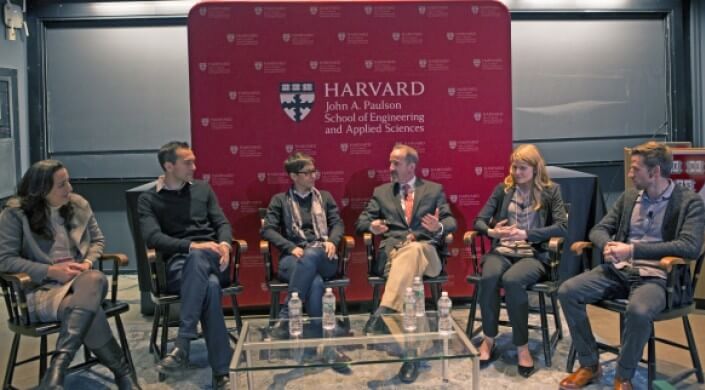News
Sophomore Convocation panelists (from left) Stephanie Kladakis, S.B. ’96, Nathan Blecharczyk, A.B. ’05, Danielle Feinberg, A.B. ’96, Dean Frank Doyle, Julia Winn, A.B. ’12, and Daniel Nevius, S.B. ’11, shared words of wisdom with new SEAS concentrators during the second-annual event. (Photo by Adam Zewe/SEAS Communications)
The largest incoming class in the 10-year history of the Harvard John A. Paulson School of Engineering and Applied Sciences (SEAS) got a peek inside their new academic home during the second annual Sophomore Convocation on Jan. 30.
More than 300 recently declared SEAS concentrators in applied math, biomedical engineering, computer science, electrical engineering, engineering sciences, and mechanical engineering packed a Science Center lecture hall to hear words of wisdom from SEAS students and alumni, and to meet their classmates.
The 378 students in this year’s class call 42 different states home; and the 15 percent who are international students hail from 34 countries on every continent except Antarctica. The most diverse in the school’s history, the SEAS Class of 2020 is comprised of 32 percent women and 21 percent underrepresented minorities, above the national averages of 20 percent and 16 percent, respectively.
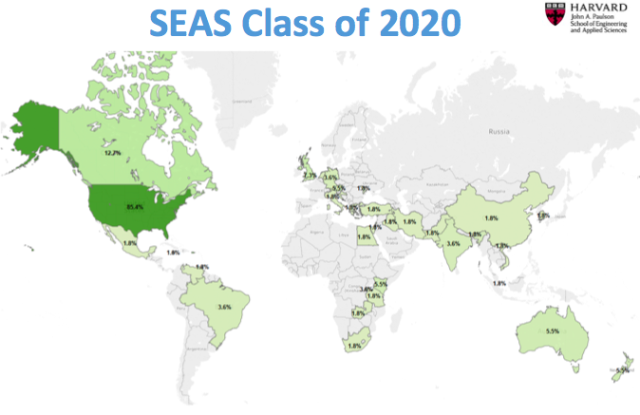
Members of the SEAS Class of 2020 hail from 34 countries on every continent except Antarctica.
“At SEAS, we strive for that feeling of diversity, inclusion, and belonging so that everyone feels welcome,” said Francis J. Doyle III, John A. Paulson Dean and John A. and Elizabeth S. Armstrong Professor of Engineering and Applied Sciences, in his welcome remarks. “All of us are committed to this enterprise to provide you with an educational experience that is truly enabling and empowering.”
During one-minute “lightning talks,” current students Neel Mehta, A.B. ’18, a computer science concentrator, Jacob Scherba, S.B. ’18, a biomedical engineering concentrator, and Akshaya Annapragada, A.B. ’20, an applied math concentrator, shared examples of how those educational experiences have been transformative.
“We have this incredible opportunity to use our skills to make some kind of positive impact on society,” said Mehta, who described internships as a software engineer at Khan Academy and a product manager at the U.S. Census Bureau. “That has really enriched my education here.”
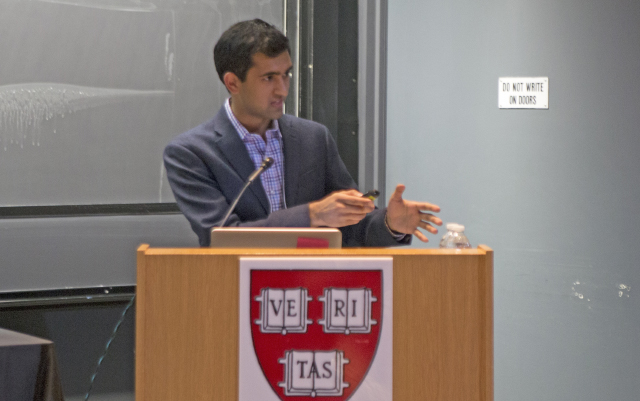
Neel Mehta, A.B. ’18, a computer science concentrator, discusses his enriching internship opportunities during a one-minute "lightning talk." Photo by Adam Zewe/SEAS Communications.
Building off the student presenters’ energy, the alumni panel launched into a discussion of their experiences at SEAS, highlighting activities that contributed to career success. Panelists included: computer science concentrators Nathan Blecharczyk, A.B. ’05, Danielle Feinberg, A.B. ’96, and Julia Winn, A.B. ’12, bioengineering concentrator Stephanie Kladakis, S.B. ’96, and electrical engineering and computer science concentrator Daniel Nevius, S.B. ’11.
“What’s very valuable about the experience of being an engineer at Harvard is that we have a top-notch engineering program, but you also get to experience so much more,” said Kladakis, vice president of research and development at Carmell Therapeutics. “When you are building your career, that ‘so much more’ is what adds to your success.”
Case-in-point: one of her former Harvard basketball teammates suggested her name to the CEO of Carmell Therapeutics when he launched the startup, Kladakis said. Similarly, Feinberg, director of photography at Pixar, first watched a Pixar short film in an extracurricular graphics group that sparked her interest in animation.
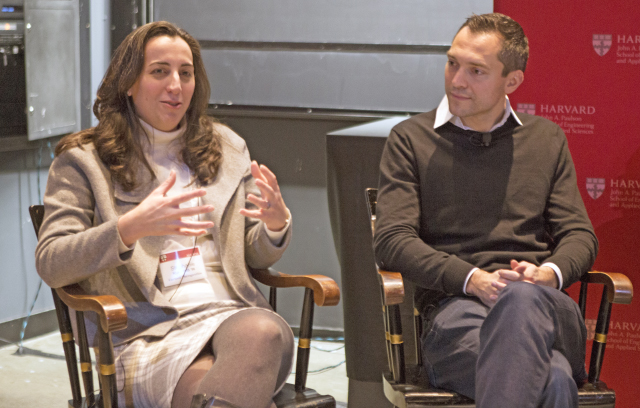
Alumni Stephanie Kladakis, S.B. ’96 and Nathan Blecharczyk, A.B. ’05, share advice with the SEAS sophomores. (Photo by Aadm Zewe/SEAS Communications)
For Winn, product manager at Google, the support and encouragement from the student group HackHarvard helped her launch a startup while she was an undergraduate, fueling an entrepreneurial mindset that has helped her succeed at Google.
Entrepreneur Nevius, co-founder of satellite startup Analytical Space, advised students to draw on the University’s wealth of resources. Connections he made in the Harvard Society for the Exploration and Development of Space have proved fruitful throughout his career, and resources provided by the Harvard Innovation Lab enabled him to launch the company.
For Airbnb co-founder Blecharczyk, who launched his first company in high school and arrived at SEAS already bitten by the entrepreneurship bug, project-based coursework imparted soft skills, like collaboration and empathy that he’s needed to succeed in business. Blecharczyk, who grew Airbnb from a fledgling enterprise to a 200 million-member international behemoth, emphasized the importance of staying inspired.
“Make sure you are always being challenged in whatever you are doing. You should think about your career as an iterative experience. It doesn’t really matter where you start, it matters where you end. And it will take a few hops to get there,” he said. “Any time when you are not being challenged is the right time to make a change.”
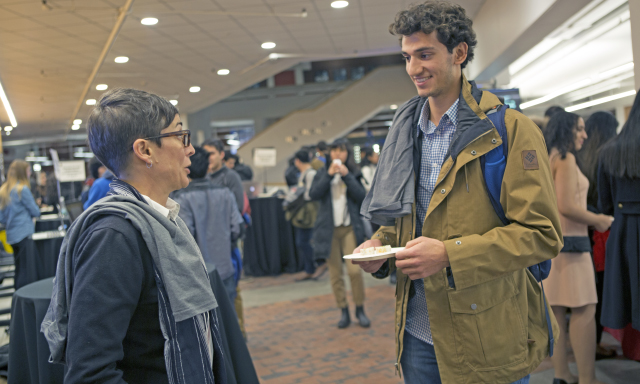
Computer science concentrator Nikhil Suri, A.B. '20, chats with alumna Danielle Feinberg, A.B. '96, during a reception after the event. (Photo by Adam Zewe/SEAS Communications)
Those words rang true for Jesse Thue, S.B. ’20, an electrical engineering concentrator who is looking forward to learning more about the design process in his future SEAS coursework.
“I’ve always wanted to make things, but I love the idea that engineering’s focus is to create a better future,” he said. “It is about solving society’s problems, using science, applied math, and applied technology, to make people’s lives better.”
Mariah Dimalaluan, A.B. ’20, a biomedical engineering concentrator, was drawn to the field after her grandfather, who lives in the Philippines, was placed on dialysis. Treatment costs are extremely expensive in the developing nation, and Dimalaluan hopes to use her education to help develop less expensive medical devices.
“The best advice I received tonight is to jump in if you are interested in something and see where it leads you,” she said. “A lot of students here worry so much about their grades, but there is very little time for us to explore our interests and try new things. College is such a good place to try everything.”
Cutting-edge science delivered direct to your inbox.
Join the Harvard SEAS mailing list.
Press Contact
Adam Zewe | 617-496-5878 | azewe@seas.harvard.edu
